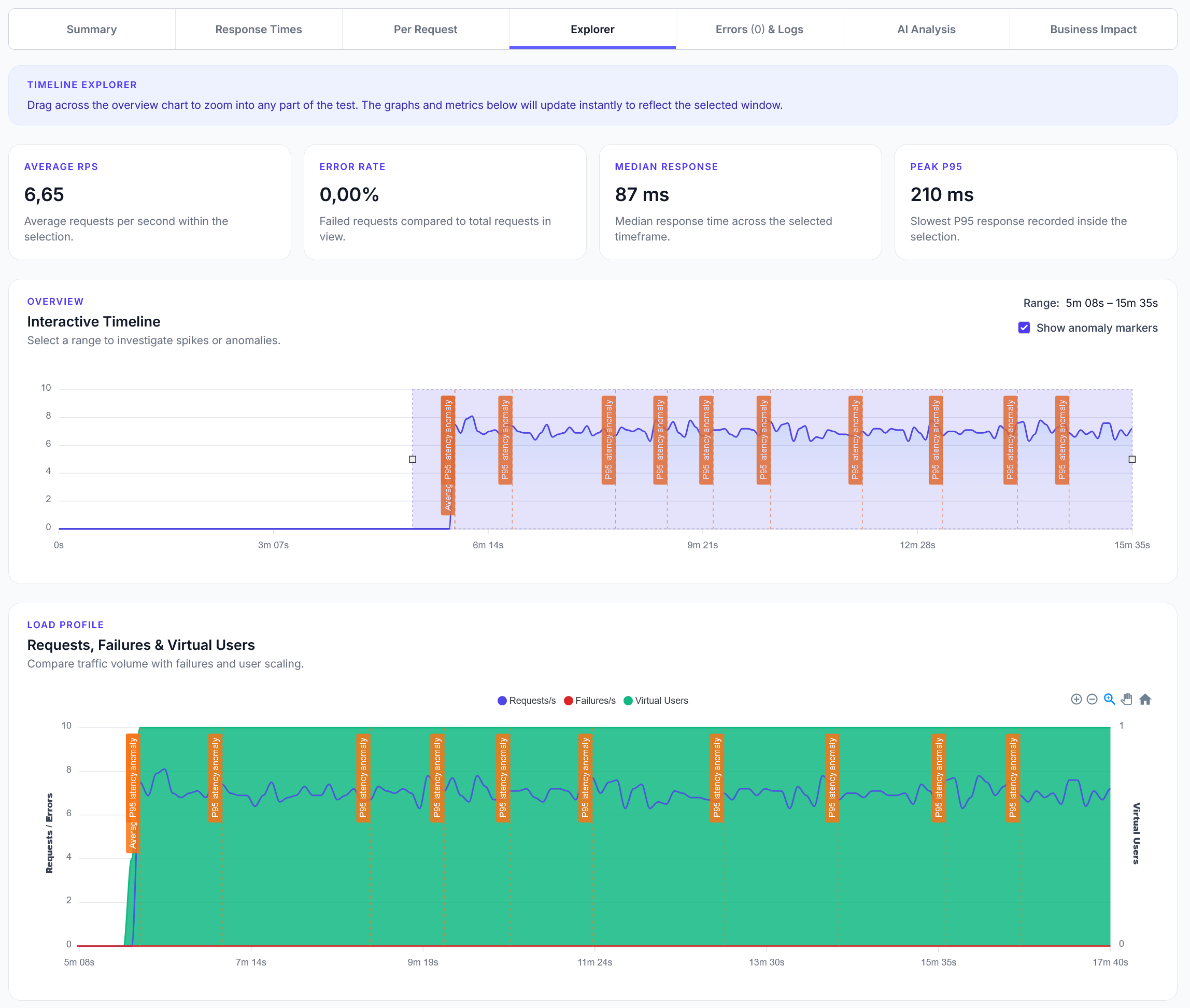
Explorer reports addition
We have added a new Explorer feature to reports, with a timeline scrubber and easy anomaly detection.
Test your application's data retention policies and automated data lifecycle management for compliance requirements
LoadForge can record your browser, graphically build tests, scan your site with a wizard and more. Sign up now to run your first test.
Test your application's data retention policies and automated data lifecycle management. This locustfile validates retention periods, data archival, automated deletion, and compliance with regulatory requirements.
from locust import HttpUser, task, between
import random
import json
import uuid
from datetime import datetime, timedelta
class DataRetentionUser(HttpUser):
"""Test data retention policies and lifecycle management"""
wait_time = between(1, 3)
def on_start(self):
"""Initialize data retention testing"""
self.user_id = str(uuid.uuid4())
# Data retention policies (in days)
self.retention_policies = {
'user_data': 2555, # 7 years
'transaction_data': 2555, # 7 years (financial)
'analytics_data': 730, # 2 years
'session_data': 30, # 30 days
'log_data': 90, # 90 days
'temporary_data': 1, # 1 day
'marketing_data': 365 # 1 year
}
print(f"Data retention testing initialized for user: {self.user_id}")
@task(3)
def test_data_creation_with_retention(self):
"""Test data creation with proper retention metadata"""
data_type = random.choice(list(self.retention_policies.keys()))
retention_days = self.retention_policies[data_type]
# Calculate retention expiry date
expiry_date = (datetime.utcnow() + timedelta(days=retention_days)).isoformat()
test_data = {
'user_id': self.user_id,
'data_type': data_type,
'content': f'Test data for {data_type}',
'created_at': datetime.utcnow().isoformat(),
'retention_policy': data_type,
'retention_expiry': expiry_date
}
with self.client.post(
'/api/v1/data/create',
json=test_data,
name=f"Create Data - {data_type}",
catch_response=True
) as response:
if response.status_code in [200, 201]:
try:
result = response.json()
if 'data_id' in result and 'retention_expiry' in result:
data_id = result['data_id']
print(f"Data created with retention: {data_id}")
response.success()
else:
response.failure("Missing retention metadata in response")
except json.JSONDecodeError:
response.failure("Invalid data creation response")
else:
response.failure(f"Data creation failed: {response.status_code}")
@task(2)
def test_retention_policy_query(self):
"""Test querying retention policies"""
with self.client.get(
'/api/v1/data/retention-policies',
name="Retention Policies Query",
catch_response=True
) as response:
if response.status_code == 200:
try:
policies = response.json()
print(f"Retention policies validated: {len(policies.get('policies', []))} policies")
response.success()
except json.JSONDecodeError:
response.failure("Invalid retention policies response")
else:
response.failure(f"Retention policies query failed: {response.status_code}")
@task(2)
def test_data_archival_process(self):
"""Test data archival for long-term retention"""
archival_request = {
'user_id': self.user_id,
'data_category': 'user_data',
'archive_reason': 'compliance_requirement',
'requested_by': 'system_test'
}
with self.client.post(
'/api/v1/data/archive',
json=archival_request,
name="Data Archival Request",
catch_response=True
) as response:
if response.status_code in [200, 202]:
try:
result = response.json()
if 'archive_id' in result:
archive_id = result['archive_id']
print(f"Data archival initiated: {archive_id}")
response.success()
else:
response.failure("Missing archive ID in response")
except json.JSONDecodeError:
response.failure("Invalid archival response")
else:
response.failure(f"Data archival failed: {response.status_code}")
@task(1)
def test_automated_deletion_process(self):
"""Test automated data deletion for expired data"""
deletion_request = {
'data_type': random.choice(list(self.retention_policies.keys())),
'deletion_reason': 'retention_expired',
'dry_run': True # Test mode
}
with self.client.post(
'/api/v1/data/automated-deletion',
json=deletion_request,
name="Automated Deletion Test",
catch_response=True
) as response:
if response.status_code == 200:
try:
result = response.json()
if 'deletion_summary' in result:
summary = result['deletion_summary']
records_to_delete = summary.get('records_to_delete', 0)
print(f"Automated deletion summary: {records_to_delete} records")
response.success()
else:
response.failure("Missing deletion summary")
except json.JSONDecodeError:
response.failure("Invalid deletion response")
else:
response.failure(f"Automated deletion test failed: {response.status_code}")
Update these settings for your data retention testing:
# Data Retention Policies (days)
RETENTION_POLICIES = {
'user_data': 2555, # 7 years
'financial_data': 2555, # 7 years
'analytics_data': 730, # 2 years
'session_data': 30, # 30 days
'log_data': 90, # 90 days
'marketing_data': 365 # 1 year
}
Use LoadForge's region selection to test data retention across different jurisdictions:
This locustfile ensures your application properly manages data retention and complies with regulatory requirements for data lifecycle management.